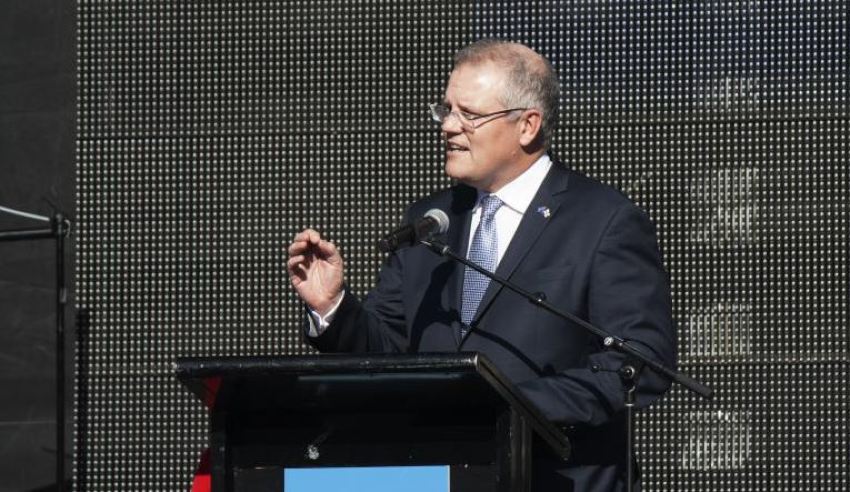An empowered national advisory council representing both sides of the political aisle would help strengthen Canberra’s efforts to combat Beijing’s “grey zone” attacks on Australia’s sovereignty, according to one analyst.
To continue reading the rest of this article, please log in.
Create free account to get unlimited news articles and more!
The Morrison government has been hard at work to shore up Australia’s defences, with last year’s $270 billion commitment to enhance Australian Defence Force capability over the next decade aimed at securing the nation against emerging threats in the region.
The need for a stronger, bolder, modernised ADF has become all the more evident in recent months, with the greatest threat to Australia’s national security, China, increasingly throwing its weight around the region, undermining ‘Pax Americana’.
In Australia, Beijing’s new tone has manifested itself through a covert cyber and economic warfare strategy, designed to force Canberra’s subservience to a new order shaped in its own image.
These ‘grey zone’ attacks have ramped up in recent months, in response to Prime Minister Scott Morrison’s defiant rebukes of Beijing’s encroachments on human rights and national sovereignty, and its handling of the COVID-19 outbreak.
But according to Ben Scott, director of the Rules-Based Order Project at the Lowy Institute, Australia needs more than just a beefed up ADF.
Scott argues that both sides of the political aisle should present a unified front on national security matters relating to the Chinese threat, which he says may escalate beyond the ‘grey zone’ in the near future.
This, says Scott, is particularly pertinent amid domestic turmoil in the US, which threatens to undermine Australia’s closest ally’s ability to deter the Chinese communist regime.
“China is gearing up for global competition with a Biden-led United States,” Scott writes.
“That’s reducing Australia’s room to move. But it also makes it more important for us to get right the things we can control.
“To make smarter China choices, Australia should change the way it debates, formulates and implements China policy.”
According to Scott, Beijing views Australia as a “frustrating anomaly in need of correction”, with Canberra’s unwavering allegiance to Washington in juxtaposition to its economic dependence on China.
As such, Scott expects the CCP to continue testing Australia’s resolve, hoping its economic stranglehold would eventually force Canberra to tap out in response to public pressure.
“As Beijing’s economic pressure on Australia begins to bite, our national debate will intensify and could polarise,” he continued.
“It’s not hard to imagine populist arguments and simplistic solutions gaining wider appeal. That’s part of China’s goal.”
The Lowy Institute director quoted the Department of Foreign Affairs and Trade (DEFAT) Secretary Frances Adamson, who recently told a Senate estimates committee that Beijing’s ultimate aim is to create internal division.
Scott adds, “The Chinese Communist Party has plenty to work with here. Our debate often crudely pits business interests against so-called security hawks.
“Different levels of government have pursued divergent China policies. Efforts to wedge Australians of Chinese ancestry from the rest of our society are especially ominous.”
Rethinking policy formation
Scott warns that countering Beijing’s divisive strategy will come with significant challenges, with Canberra unwilling to engage the CCP in a race to the bottom.
“The best antidote to grey zone behaviour is often sunlight. But sometimes Australia itself will also have to enter the murky grey zone,” he contends.
Drawing on Australia’s experiences countering the global terrorist threat, Scott calls for a “new mechanism” that summarily balances the requirements of secrecy with the need for accountability and a well-informed political debate.
Scott cites recommendations handed down by former defence secretary Dennis Richardson in his review into intelligence legislation, noting that the Parliamentary joint committee on intelligence and security should be granted more oversight authority, resembling that given to US counterparts.
“Australia’s reluctance to follow the US is based on confidence in our Westminster system of ministerial accountability and in our independent statutory bodies, such as the IGIS,” he said.
“That confidence has no doubt been reinforced by recent US politics, including alarming efforts to use classified intelligence for partisan political gain.
“Australia needs to get ahead of political populism. Pride in our model is well founded but missing the point."
He continued: “Meeting the China challenge is not just a matter of ensuring the legality of Australian actions. We need to forestall Chinese efforts to stoke division within Australia, enhance our national debate and build a bipartisan foundation for Australian engagement in grey zone competition.”
Accordingly, Scott recommends the formation of a “bipartisan cabinet-like body”, similar to those establishing during wartime.
“At the beginning of World War II, the Labor opposition rejected Robert Menzies’ offers to form a government of national unity, but it agreed to join an Advisory War Council,” he says.
“This body lacked executive powers but made recommendations accepted by cabinet. More recently, the government has formed a nominally ‘national cabinet’, including premiers and chief ministers from both parties, to improve our response to COVID-19.
“Australia is not on the verge of war, but nor are we entirely at peace. A national security advisory council that included key ministers and their opposition counterparts could review classified information and operational proposals in a secure, apolitical environment and make discreet recommendations to cabinet.”
Scott adds that a national council could also issue public statements that define areas of bipartisan consensus and hence narrowed the terms of the national debate.
He concluded: “A more informed and better focused debate should produce the smarter China policies we will need.”
Get involved with the discussion and let us know your thoughts on Australia's future role and position in the Indo-Pacific region and what you would like to see from Australia's political leaders in terms of partisan and bipartisan agenda setting in the comments section below, or get in touch with

 Login
Login







